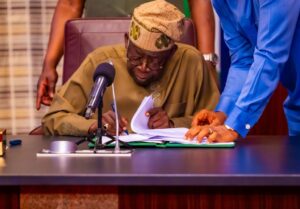Executive Summary
Recent public statements and activist reports have alleged that the Federal Government of Nigeria, through the Ministry of Petroleum Incorporated (MOPI) and the Ministry of Finance Incorporated (MOFI), is planning to sell significant portions of the Federation’s equity in major upstream oil and gas Joint Ventures (JVs). These include the Renaissance Africa Energy Company JV (formerly SPDC JV), the Oando JV (formerly NAOC JV), and the Seplat Energy Producing Nigeria Unlimited JV (formerly MPNU JV). Claims also circulate that specific percentages—ranging from 25% to 35%—are being sold to private individuals and companies such as Sterling Global Oil, Oando, and Gilbert Chagoury’s group.
Additionally, critics warn of a proposed amendment to the Petroleum Industry Act (PIA) of 2021, allegedly targeting sections 8, 9, 53, 63, 64, and 85, with accusations that such amendments are designed to serve narrow private interests.
This report critically evaluates the veracity of these claims, places them in historical and economic context, compares Nigeria’s situation with peer oil-producing states, and proposes governance and communication strategies. The evidence shows:
No credible official documentation exists to confirm that the Federation is selling its JV equity to the named buyers. Rather, the only confirmed transactions are International Oil Company (IOC) divestments of their private stakes.
The Federation’s 55–60% JV equity remains intact. Any sale would require regulatory approvals, parliamentary oversight, and public disclosure, none of which have been recorded.
The PIA amendment claim lacks substantiation. What is on record is a 2025 Executive Order on cost efficiency in upstream petroleum operations, which is not an amendment to the Act.
Historically, Nigeria has maintained majority JV stakes as a pillar of national control. Altering this would be a major strategic shift, one that cannot happen quietly.
Comparative examples from Norway, Brazil, and Angola show that State Oil companies do restructure, but always through transparent, well-communicated processes.
Conclusion:
The circulating reports are largely misrepresentations that conflate genuine IOC divestments with a false narrative of state asset sales. However, the lack of proactive communication by government has created fertile ground for misinformation.
1. Historical Context of Nigeria’s JV Structure
Nigeria’s oil and gas industry has been organized around joint ventures since the late 1960s, when Shell and other IOCs were compelled to enter into shared ownership arrangements with the newly empowered Nigerian State. By the mid-1970s, NNPC was established and the Federation began taking 55–60% equity stakes in all major onshore and shallow-water operations.
Classic JV example (SPDC JV): NNPC 55%, Shell 30%, TotalEnergies 10%, Agip 5%.
Revenue backbone: These JVs historically provided 80–90% of Nigeria’s oil production and contributed massively to national revenues.
Structural problem:
By the 1990s–2000s, cash-call arrears and inefficiencies weakened the model, leading to increased reliance on Production Sharing Contracts (PSCs) in deepwater.
The JV system remains central to Nigeria’s fiscal stability. Any change in Federal equity therefore has systemic implications, far beyond corporate balance sheets.
2. Economic Weight of JV Assets
Oil revenues still account for roughly 80% of Nigeria’s foreign exchange earnings and about 50% of government revenues, despite diversification rhetoric.
In 2022, Nigeria earned around $45 billion from oil exports, with JVs contributing the majority share.
NNPC Ltd, corporatised in 2021 under the PIA, remains the custodian of these JV equities, held in trust for the Federation through MOPI and MOFI.
Thus, the stakes under discussion are not abstract percentages—they are among the most reliable sources of forex and fiscal stability. A reduction in State Equity would directly reduce Federal take, unless offset by higher taxes or royalties.
3.What Actually Happened: IOC Divestments vs. FG Equity Sales
Shell → Renaissance (RAEC JV)
Fact: In March 2025, Shell completed the sale of its onshore subsidiary (SPDC) to Renaissance Africa Energy Company (RAEC).
Impact: Renaissance now holds Shell’s 30% stake in the SPDC JV.
FG equity: Still intact at 55%. No evidence of NNPC selling down.
Eni → Oando (NAOC JV)
Fact: In 2024, Oando acquired 100% of Eni’s Nigerian Agip Oil Company (NAOC) Ltd, increasing its JV interest from 20% to 40%.
Impact: JV structure now: NNPC/NEPL 60%, Oando 40%.
FG equity: Still intact at 60%.
ExxonMobil → Seplat (SEPNU JV)
Fact: In early 2025, Nigeria approved the $1.28 billion sale of ExxonMobil’s Mobil Producing Nigeria Unlimited (MPNU) to Seplat Energy.
Impact: Seplat now operates as Seplat Energy Producing Nigeria Unlimited (SEPNU).
FG equity: NNPC continues to hold 60% in associated assets.
Key Point: These transactions were IOC exits, not State Asset disposals.
4. Dissecting the Claims of State Sales
The viral reports allege:
RAEC JV: FG selling 25% of its 55% to Sterling Global Oil.
Oando JV: FG selling 25% of its 60% to Oando.
SEPNU JV: FG selling 35% of its 60% to a Chagoury-owned company.
Fact check:

None of these alleged sales appear in official press releases from NNPC Ltd, NUPRC, MOFI, or the Presidency.
They are absent from global oil industry trackers (Bloomberg, Reuters, Argus).
They have not been disclosed in company filings by Oando or Seplat (both listed entities).
Conclusion:
The percentages and names are fabricated or speculative extrapolations from genuine IOC transactions.
5. The PIA Amendment Narrative
The Petroleum Industry Act (2021) was hailed as a landmark reform that finally consolidated 16 years of draft bills. It restructured NNPC into a commercial limited liability company, established regulatory commissions, and created a new fiscal framework.
Claims: Critics say sections 8, 9, 53, 63, 64, and 85 are to be amended to hand resources to cronies.
Reality:
No bill or gazette supports this.

What has happened: in April 2025, President Tinubu signed an Executive Order on Cost Efficiency in Upstream Petroleum Operations. This introduced tax incentives and reduced contracting timelines—measures intended to boost investment.
An Executive Order is not an amendment to the PIA. Only the National Assembly can amend the Act.
Thus, while industry stakeholders may debate fiscal tweaks, the viral claim of a secret amendment benefitting individuals lacks substance.
6. Comparative Analysis: Lessons from Other Petrostates
Norway (Equinor / Petoro)
Norway maintains state equity in licenses via Petoro but allows Equinor to operate commercially.
Any change in state equity is transparent, debated in parliament, and publicly documented.
Brazil (Petrobras)
Petrobras has periodically sold non-core assets, but always through stock market mechanisms or open bidding, ensuring price discovery.
Angola (Sonangol)
Sonangol has divested some upstream assets but under a national privatization framework with IMF oversight.
Nigeria can learn: State divestment is not inherently bad, but it must be transparent, competitive, and communicated.
7. Political Economy and Public Trust
Nigeria’s political environment is highly charged. In such contexts:
Misinformation thrives when government communication is slow.
Opposition groups exploit opaque processes to spin narratives of asset capture.
Citizens, scarred by past scandals, are predisposed to distrust.
Therefore, the government’s task is not only to manage resources prudently but also to communicate decisions in real time.
8. Risks of Miscommunication
Economic risk: Perceptions of asset giveaways can discourage foreign investors.
Political risk: Rumours of cronyism fuel opposition attacks and street protests.
Social risk: Host communities, already restive, may interpret divestments as loss of benefits.
These risks underscore the necessity of transparency and stakeholder engagement.
9. Recommendations for Government
1. Official Clarification: Release a single, detailed statement from NNPC Ltd, MOFI, and the Presidency on the status of FG equity in all major JVs.
2. Public Registry: Expand the National Asset Register to include live data on JV equity holdings and any divestment processes.
3. Divestment Protocol: If FG ever chooses to sell equity, outline the process: valuation method, competitive bidding, parliamentary approval.
4. Stakeholder Engagement: Host quarterly briefings with labour unions, host communities, and industry stakeholders.
5. Differentiate Instruments:
Clarify the difference between Executive Orders (administrative) and PIA amendments (legislative) to avoid confusion.
6. Benchmark Against Global Best Practice: Study how Norway, Brazil, and Angola communicate State asset restructuring if required.
10. Vindicating the President’s Role
As Minister of Petroleum Resources, President Bola Tinubu has the constitutional mandate to restructure the sector to improve efficiency. Issuing Executive Orders to reduce costs is within his remit. What is critical is to demonstrate that reforms are guided by national interest, not private enrichment.
The current narrative risks mischaracterizing legitimate reforms as asset stripping. A proactive, transparent communication and perception management strategy would prevent this.
11. Expanded Case Studies
Case Study 1: Shell Divestment (2021–2025)
Negotiations began in 2021 for Shell’s exit from onshore operations.
Multiple local bidders emerged. Renaissance Africa Energy won after a competitive process.
FG equity remained intact.
Case Study 2: Eni/Oando Transaction (2023–2024)
Oando, a Nigerian independent, purchased Eni’s NAOC assets.

Approved by NUPRC.
Again, FG equity was untouched.
Case Study 3: ExxonMobil/Seplat Deal (2019–2025)
Stalled for years over ministerial consent.
Eventually approved in 2025.
FG equity was unaffected.
These illustrate that while Nigeria has experienced major ownership changes recently, they were vendor-led divestments, not government sell-downs.
12. Word on the Petroleum Industry Act
The PIA was designed to:
Provide clarity after decades of uncertainty.
Transform NNPC into a commercially viable entity.
Introduce host community funds and new fiscal terms.
Amending it so soon would send mixed signals to investors. Thus, the President’s approach—using Executive Orders for operational flexibility—avoids legislative disruption.
13. Future Outlook
Global energy transition pressures mean Nigeria must maximize value from its oil now.
Attracting investment is critical, which requires stable laws and predictable ownership structures.
Any real FG equity sale should be positioned as part of a strategic restructuring, communicated transparently, and executed competitively.
14. Conclusion
The viral claims of FG secretly selling down JV equity to private cronies are unsubstantiated. They conflate IOC divestments with state equity, misstate percentages, and misidentify beneficiaries.
The Petroleum Industry Act remains intact; the only confirmed reform is a 2025 Executive Order on upstream cost efficiency.
The President and his administration retain full right to reform the sector. However, given Nigeria’s history of mistrust, it is vital to ensure due process, transparency, and proactive communication.
Truth: Nigeria has not sold its crown jewels in upstream oil and gas.
Falsehood: The Federation is secretly reducing its JV stakes for private benefit.
Imperative: Government must speak clearly and regularly to avoid misinformation.
“It is deeply troubling that certain individuals and coalitions, driven by narrow ambition, are resorting to propaganda that can destabilize the polity. Over 80% of our citizens are either illiterate or semi-literate, which places a greater burden of responsibility on leaders and commentators to speak truth, not falsehood. To circulate unverified claims about the nation’s most strategic sector, without even the courage to sign a name, is not only unpatriotic—it borders on treason. Nigeria’s oil and gas industry is the backbone of our economy and must not be reduced to a tool for cheap politics. Intelligent Nigerians can see the intention behind such viral fabrications: to incite unrest where none is justified. We therefore call on all political actors to refrain from playing politics with misinformation. The destiny of this nation is too important to be mortgaged for propaganda.”
— Princess Dr. G. Adebajo- Fraser, MFR.The National Patriots.
Princess G. Fraser MFR
CEO, Fraser Consulting Consortium.
( International Energy Consultants)

Published by HeadlineNews.News Special Desk.




